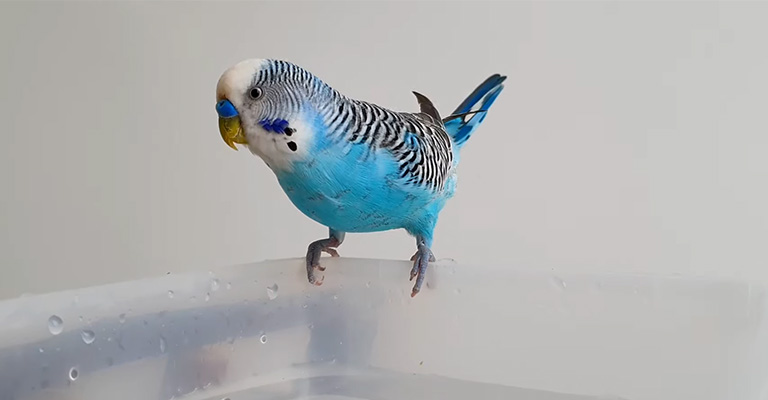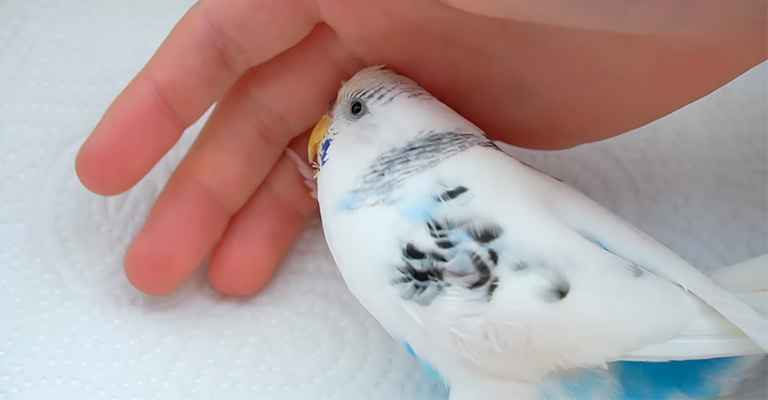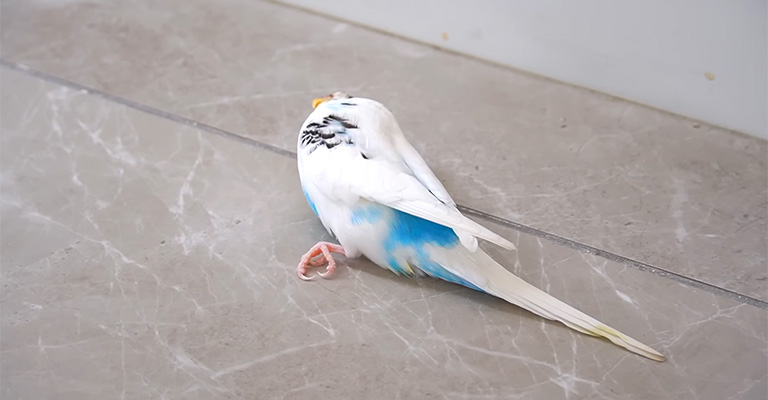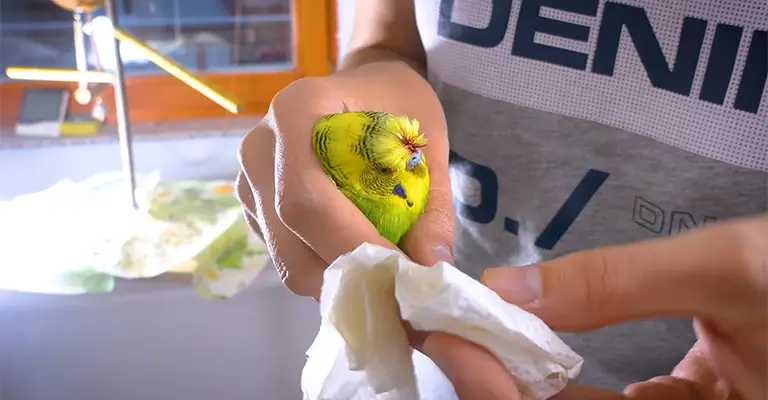Birds are delicate creatures that need proper care to maintain their health and well-being. And vomiting is a common issue that we face so often. That’s why many of ask often concern about why the birds vomit so often.
Vomiting in birds can be caused by various reasons, including bacterial infections, parasites, poisoning, and intestinal or esophageal obstructions.
If you manage to understand the causes, symptoms, and treatment options for bird vomiting, you can easily ensure prompt and proper care can help prevent more serious health problems.
In this blog, we will discuss the various causes of bird vomiting, the symptoms to look out for, and the treatment options available to help your feathered friend recover.

Causes of Bird Vomiting
There can be different reasons that can cause birds to vomit and get sick. The most common causes are as followed.
Bacterial Infections
Bacterial infections are a common cause of bird vomiting, which can be caused by spoiled food or old water. Birds can easily contract a bacterial infection from contaminated food or water sources, which can lead to digestive problems, including vomiting.
Parasites

Parasites, such as worms and Hexamita, can also cause bird vomiting. These parasites can live in a bird’s gut and feed on their food, leading to digestive problems and vomiting.
Poisoning and Toxins
Poisoning and exposure to toxins, such as plants and toys containing lead or zinc, can also cause bird vomiting. Birds are particularly susceptible to toxins, as they have a sensitive respiratory and digestive system.
Intestinal or Esophageal Obstructions
Intestinal or esophageal obstructions, such as blockages caused by swallowed objects or growths, can also lead to bird vomiting. These obstructions can prevent food from passing through the digestive system, leading to digestive problems and vomiting.
Other Potential Causes

Other potential causes of bird vomiting include stress, anxiety, illness, and changes in diet. In some cases, a bird’s vomiting may also be caused by a combination of these factors.
It’s important to note that vomiting in birds can be a sign of a more serious health problem, and prompt veterinary attention is necessary to diagnose and treat the underlying cause.
Symptoms of Bird Vomiting
When it comes to bird vomiting, it’s important to understand the difference between regurgitation and vomiting. Regurgitation is a natural behavior in birds, often seen as a way of sharing food with a mate or chick. During regurgitation, a bird will pump its throat and produce a neat lump of food.
On the other hand, vomiting occurs when a bird is feeling unwell and is uncomfortable before releasing its contents.
In addition to regurgitation vs. vomiting, there are several physical symptoms that can indicate a bird is experiencing vomiting. Some of these include:
- Loss of appetite
- Diarrhea
- Weakness and lethargy
- Ragged or frayed feathers
- Increased thirst
- Abnormal breathing or panting
- Sneezing or nasal discharge
In addition to physical symptoms, it’s important to also keep an eye out for changes in your bird’s behavior and activity level. For example, a normally active bird that suddenly becomes inactive and less interested in play could be a sign of vomiting.
Similarly, a bird that stops eating, drinking, or singing as much, as usual, could also indicate an issue with vomiting.
It’s important to pay close attention to these symptoms, as they can help you determine if your bird is experiencing vomiting or if there’s an underlying health issue that needs to be addressed.
Diagnosing Bird Vomiting

Diagnosing bird vomiting is crucial to determine the underlying cause and ensure proper treatment. The examination and testing performed by a veterinarian is the best way to identify the cause of vomiting in birds.
Importance of a Veterinary Examination
A thorough examination by a veterinarian is important to evaluate the bird’s overall health and determine the cause of vomiting. The veterinarian will perform a physical examination and ask about the bird’s history and symptoms to get a better understanding of the problem.
Testing and Procedures to Identify Causes
To determine the cause of vomiting, the veterinarian may recommend various tests such as a complete blood count, biochemical profile, X-rays, and endoscopy. These tests can help identify any underlying medical conditions, bacterial or parasitic infections, and gastrointestinal obstructions.
Differentiating Between Regurgitation and Vomiting
A veterinarian can help differentiate between regurgitation and vomiting based on the physical examination and the results of the tests.
Regurgitation is a natural process in birds, where food is expelled from the crop, while vomiting is the forceful expulsion of food from the digestive system.
Understanding the difference between the two is important in determining the cause of the vomiting and developing an appropriate treatment plan.
A veterinary examination is crucial to diagnose and treat bird vomiting. The veterinarian will evaluate the bird’s health and perform various tests to determine the cause of the vomiting and provide the best treatment plan for your bird’s health and well-being.
Treating Bird Vomiting
Treating bird vomiting requires a diagnosis of the underlying cause. In some cases, the treatment may simply involve removing the source of the problem, such as removing a toxic substance from the bird’s environment.
In other cases, more intensive treatment may be required, including antibiotics or other medications to address bacterial infections or parasites.
Treatment Options Based on Cause
The specific treatment options for bird vomiting will depend on the underlying cause of the problem.
Some common causes of bird vomiting and their corresponding treatments include:
- Bacterial infections: Antibiotics are typically used to treat bacterial infections in birds. These medications may be administered orally or intravenously, depending on the severity of the infection.
- Parasites: Anti-parasitic medications may be used to treat infestations of parasites in birds. In some cases, these medications may need to be given over a period of time to ensure complete elimination of the parasite.
- Poisoning and toxins: Treatment for poisoning in birds will depend on the type and amount of toxin ingested. In some cases, activated charcoal may be given to absorb the toxins, while in other cases, supportive care such as IV fluids may be necessary.
- Intestinal or esophageal obstructions: If a physical obstruction is causing the bird to vomit, surgery may be necessary to remove the blockage.
Medications and Procedures
In addition to medications, other treatments for bird vomiting may include:
- Feeding changes: Your veterinarian may recommend changes to your bird’s diet to help reduce the risk of vomiting. This may include feeding smaller, more frequent meals or switching to a different type of food.
- Probiotics: Probiotics may be used to help restore the balance of beneficial bacteria in the bird’s digestive system.
- Surgery: In some cases, surgery may be necessary to remove an obstruction or address another underlying cause of vomiting.
Importance of Follow-up Care and Monitoring
Regardless of the cause and treatment of bird vomiting, it is important to monitor your bird closely for any signs of worsening symptoms or new symptoms.
Follow-up appointments with your veterinarian will help ensure that the treatment is working and that any necessary adjustments can be made.
In addition, it is important to maintain good hygiene practices and a clean environment to help prevent the spread of any infections or parasites.
Prevention and Management
Prevention and management of bird vomiting is a critical aspect of pet bird health. By taking a proactive approach, bird owners can minimize the risk of their pets developing this condition and ensure prompt treatment if it occurs.
Maintaining a Clean and Safe Environment
One of the most effective ways to prevent bird vomiting is by maintaining a clean and safe environment for your pet.
This means keeping the bird’s cage and surrounding area clean, providing fresh water and food daily, and avoiding exposure to toxins or harmful substances. It is also important to keep the cage away from any sources of stress, such as loud noise or other pets.
Proper Diet and Nutrition
A balanced diet and proper nutrition are essential to keeping your bird healthy. Feed your pet a varied diet that includes fresh fruits and vegetables, seeds, and high-quality commercial bird food. Make sure to provide adequate quantities of food, and avoid overfeeding.
Regular Check-ups With a Veterinarian
Regular veterinary check-ups are an important part of bird health management. Your veterinarian can help you determine the best diet and care for your pet and can also help diagnose and treat any potential health issues.
Regular visits also help to ensure that your bird is receiving the necessary preventive care and vaccinations to keep it healthy and prevent the onset of vomiting or other health problems.
By taking these steps, bird owners can help prevent bird vomiting and ensure prompt treatment if it does occur. With proper care and attention, pet birds can live happy and healthy lives.
Summary of Key Points on Bird Vomiting
| Topic | Summary |
| Causes | Bacterial infections, parasites, poisoning and toxins, intestinal or esophageal obstructions, and other potential causes |
| Symptoms | Regurgitation vs. vomiting, other physical symptoms, changes in behavior and activity level |
| Diagnosis | Importance of a veterinary examination, testing and procedures to identify causes, differentiation between regurgitation and vomiting |
| Treatment | Importance of a veterinary examination, testing, and procedures to identify causes, differentiation between regurgitation and vomiting |
| Prevention and Management | Maintaining a clean and safe environment, proper diet and nutrition, regular check-ups with a veterinarian |
This table provides a concise overview of the key points discussed in the article on bird vomiting, including causes, symptoms, diagnosis, treatment, and prevention and management.
FAQs
Can vomiting in birds be a sign of a more serious health issue?
Yes, vomiting in birds can be a symptom of a more serious underlying health issue, such as a bacterial infection, parasite infestation, or an obstruction in the digestive system. It is important to have your bird evaluated by a veterinarian as soon as possible if they are experiencing vomiting.
What should I do if my bird is vomiting?
If your bird is vomiting, it is important to seek veterinary care as soon as possible. The veterinarian will perform a thorough examination and may recommend diagnostic testing to determine the underlying cause of the vomiting. Treatment options will depend on the cause and may include medication, dietary changes, or surgery.
Is it normal for birds to regurgitate occasionally?
Some species of birds, such as parrots, naturally regurgitate as a way of bonding with their owners or mates. However, excessive or frequent regurgitation can be a sign of an underlying health issue and should be evaluated by a veterinarian.
Can I prevent my bird from vomiting?
You can help prevent vomiting in birds by providing them with a clean and safe environment, a well-balanced diet, and regular check-ups with a veterinarian. Keeping their living area free of toxins and other potential hazards can also help reduce the risk of vomiting and other health issues.
Is it safe to treat a vomiting bird at home?
It is not recommended to treat a vomiting bird at home without the guidance of a veterinarian. The cause of the vomiting may be serious and require veterinary care and treatment. Self-treating without a proper diagnosis can also make the condition worse.
Conclusion
Always remember that bird vomiting can be a serious issue for pet birds and should not be ignored. Early identification and treatment of the underlying cause are essential for a successful outcome.
To help prevent bird vomiting, it is important to maintain a clean and safe environment, provide a proper diet and nutrition, and regularly take your bird to a veterinarian for check-ups.
Make sure to be aware of the signs and symptoms of vomiting, as well as the different causes, so you can take prompt action if your bird is showing signs of distress.
By working closely with a veterinarian and providing appropriate care, you can help ensure your bird stays healthy and happy. Best of luck.